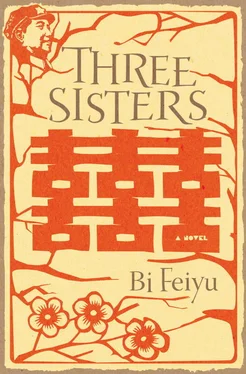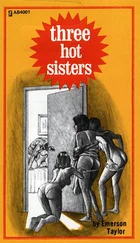“I’m glad you’re pregnant,” she said in a soft voice. “Go ahead, have this one. It’s wonderful you’re not barren.”
A spring wind is wild—as a spring wind ought to be. There is an old saying that “A spring wind can cleave rocks, so wear a hat if you don’t want a split forehead.” That, in essence, is the power of a spring wind. Where cold weather is concerned, neither the third nor the fourth nine-day period after the winter solstice ranks as the coldest. For that, one must wait for deep autumn or early spring. The ground splits during the winter months, but since people protect themselves with padded clothing and seldom go out into the fields, the effects of the cold are seldom felt. That is not the case in deep autumn or late spring, when hands and feet have chores to do and cannot be constricted by heavy clothes. The harder the work, the more a person sweats, and thin clothes are the only answer. Winds seldom rise up in deep autumn, but early in the morning and late in the afternoon the ground is covered by chilled dew—a silent cold, but especially bitter. What makes early spring different is the wind. While not particularly biting, it blows with great force; but most important is its patience as it meticulously whistles and howls past every bare branch from morning to night, each limb of a fine tree like a new widow. The chill of an early spring day owes its existence to the unpredictable winds.
The vast fields of wheat were green and appeared full of life. But on closer examination, every shivering tassel gave off an icy chill. In the springtime there is nothing worse than frost. Three frosty days inevitably lead to spring rains; old-timers like to say that “Rains come three days after a frost.” Spring rains are as precious as oil, but only for crops; for humans they are sheer misery. It will rain for days on end. Different from normal rainfalls; not a downpour, but a mist that wraps around you so that you cannot hide. Everything is wet, the air and the ground; even pillows retain a dampness that makes the days cold and dirty.
There was water everywhere in Wang Family Village; moisture filled the air, the wind blew. People went to bed early and slept in late, and those who knew how to economize got by on two meals a day, a tradition passed down by their forebears. During the period between harvests and plantings, they slept a lot, finding hunger easier to stave off horizontally than vertically. With less food in their bellies, it was only natural to slack off, and the pigs in their pens suffered. Unlike humans, pigs were incapable of lying down to sleep when they were hungry. And so they made loud, noisy complaints—ear-assaulting sounds, unlike the happy clucking of chickens and the barking of dogs, which have an almost serene quality, especially from a distance. Those were comforting sounds. But who can stand the noise of pigs when they sound like the transmigrated souls of hungry ghosts? Day in and day out they gave cacophonous voice to their grievances.
No sun in the sky and no moon. Darkness brought tranquillity to Wang Family Village. The sky turned dark, and Wang Family Village was once again stilled.
Then something really big happened.
There had been no warning signs before Wang Lianfang was caught in Qin Hongxia’s bed. Wang Family Village was quiet, all but the sows and boars in their pens, complaining of hunger. Dinners were cooking on stoves whose chimneys sent smoke into the air to merge with the evening fog; steam rose from countless treetops. All in all, it felt like a peaceful night lay ahead until the stillness was shattered when Wang Lianfang and Qin Hongxia were caught in bed, thanks to Qin’s foolish mother-in-law. When it was over, people called her a dimwit, a simple-minded woman. Why all the shouting? Shout if you must, but “Help, murder!”? What was that all about?
If the mother-in-law had been a woman with her head on straight, Wang Lianfang would have gotten away just fine. Unfortunately, he was dealing with a simpleton. Everything was progressing just fine when Qin Hongxia’s mother-in-law began shouting, “Help, murder! Help, murder!” Her shouts traveled far in the moist air and rang clear, alerting neighbors, who picked up whatever was handy and ran into Qin Hongxia’s yard. Her husband, Zhang Changjun, an artilleryman stationed in Henan province, had resolved his organization problem—in other words, his application to join the Party—the year before and was scheduled to be discharged in the fall. Since he was away from home, Qin Hongxia’s neighbors helped out whenever they could, so when her mother-in-law bellowed “Help, murder!,” how could they not come to her rescue? She stood in the middle of the yard, so breathless that she could only point to the window that she’d thrown open. The door, on the other hand, was tightly shut. Neighbors filled the yard. One crept cautiously up to the window, carrying pole in hand, while another, emboldened by the rake he held, kicked the door open. Wang Lianfang and Qin Hongxia were frantically getting dressed, but the way their buttons were misaligned showed that they were wasting their time. Wang tried to appear unruffled, but he’d been caught in the act, and there was no getting out of it. Losing his customary calmness, he took out a pack of Flying Horse cigarettes and said, “Have a cigarette, there’s enough for all of you.”
Did he really think this was the time to smoke?
It was a grim situation. Most of the time, if someone offered Wang a cigarette, he checked the brand before he accepted it. Now here he was offering everyone a Flying Horse, and there were no takers. Yes, a grim situation.
The deathly stillness that night was so acute you’d have thought a murderous rampage had wiped out the village. By that time, Wang Lianfang was in town, standing in front of the commune Party secretary’s desk. Wang Lianfang’s superior was livid. Under ordinary circumstances he and Wang Lianfang had a special relationship, but now he was pounding the table. “What were you thinking?” he roared. “How could you be so stupid?”
Wang Lianfang went soft; his eyes were closed and he was slumping badly.
“Maybe I should be placed on probation,” he said prudently.
That ratcheted up Commune Secretary Wang’s anger. He banged the table again. “Stop mouthing shit,” he shouted. “The wife of a soldier on active duty? This is high voltage stuff! This time the law’s involved.”
The situation had turned even more grim. Wang Lianfang knew instinctively that unless he thought of something quick, the law really would be involved. Nothing had happened to him the first time—or the second, for that matter—but he wouldn’t be so lucky this time. Everything changed when his superior said the law was involved. The commune secretary unbuttoned his tunic and stood with his hands on his hips, his elbows raising the back of the tunic high above his waist. This was how leading officials invariably reacted to a crisis, even in the movies. Wang Lianfang’s eyes were glued to the secretary’s back as he threw open the window and thrust out his arms: “They caught you in the act, so tell me, what am I supposed to do? What the hell am I supposed to do?”
Punishment was meted out with the same speed that the incident had been discovered. Wang Lianfang lost both his job and his Party membership. Zhang Weijun took over as branch secretary. Wise decisions across the board. Wang Lianfang met them with silence, and there was nothing members of the Zhang clan could say.
Events followed a logical course, slow when they needed to be and fast when that was required. Wang Lianfang’s family crumbled in a matter of days. On the surface, of course, everything seemed normal: the bricks and tiles remained in place, needles and thread stayed by the bed where they belonged. But Yumi knew that her family had unraveled. Happily, Shi Guifang had said nothing about Wang Lianfang’s affairs from the beginning, not a word. Her only reaction was to dissolve into belches. This time, she had lost face as a woman on two levels, so she took to her bed and slept for days. When she finally got up, she was a study in languor, but not the sort of languor that had followed Little Eight’s birth. That had been accompanied by a sense of pride, for it had been her own doing, happily floating with the current. This time she sailed against the tide, and she had to find the strength to deal with it. That would take hard work and perseverance. Now, when she opened her mouth to speak, a foul odor emerged.
Читать дальше











